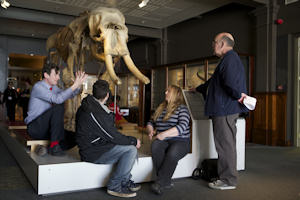Museum has objects in mind
23 Jun 2014
Partnership with School of Psychological Sciences to improve visitors’ mental health

It is a long held belief that using museum collections can improve people’s mental health – and a new project at Manchester Museum is putting that into practice.
Damian Scully is a Heritage Lottery Fund (HLF) Skills for the Future trainee. As part of his 18 month Diploma in Culture and Heritage, he has developed an innovative programme ‘Objects in Mind’ to create unique museum experiences to enhance visitors’ mental health.
‘Objects in Mind’ takes a multiple meaning approach to museum objects looking not just at the empirical and scientific definitions but also cultural connections.
Damian explains: “We consider what the people who made it thought, what did the object mean to them and how does that influence our viewpoint.”
The main museum objects chosen for the sessions make excellent subjects for these discussions.
Damian adds: “The Museum’s elephant Maharajah can be a symbol for mental health – the ‘elephant in the room’ so to speak, in which something is present but not avoided. Mental health is something we all possess whether good, bad or indifferent, but is often only acknowledged in times of crisis and disorder.
“Maharajah was a distressed animal that smashed up a train car in 1872 during his celebrated journey walking from Scotland to Belle Vue Zoo. Would this have been the case if Maharajah had been a person forced in to a situation they did not choose?”
Key to the progress that Damian has made is a partnership with colleagues in the Faculty of Medical and Human Sciences. Yvonne Awenat is a Research Fellow in the School of Psychological Sciences and an important area of her work is around involving people in the design and implementation of research studies.
Yvonne says: “Involving people with ‘lived experience’ of the area being studied, to guide and advise the research team, can help to produce really effective and meaningful research.”
Yvonne added: “Objects in Mind fits into the ethos of the kind of work we’re doing here – conducting research that aims to improve the lives of people with psychological distress and offering opportunities to be involved in the research process, which can often help them make sense out of an experience that they didn’t want, they didn’t like and has been very difficult for them.
“Helping other people by sharing personal experiences can bring a different perspective to the situation and something positive can come out what might have been a very negative experience.”
She continues: “Museum sessions open up communication opportunities for people – social interaction with an opportunity to think of things outside of their problems and difficulties in a real life, non-medicalized, normal social situation.”
“And as the project has been co-produced by Damian, we can be confident of creating something really beneficial and meaningful rather than tokenistic.”
Feedback from participants has been excellent. One said: “The whole thing was brilliant. I loved the way Damian, related the objects and displays to deeper meanings around history and ways of seeing mental health. The handling session was a fantastic interactive addition.”
- To find out more about Objects in Mind contact Damian Scully on damian.scully@manchester.ac.uk
